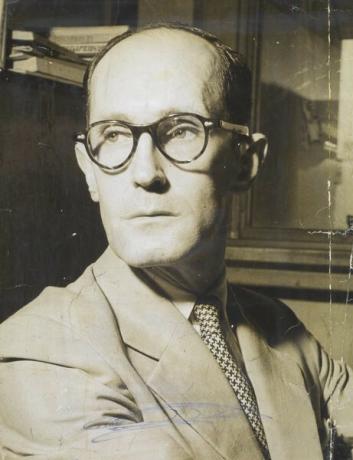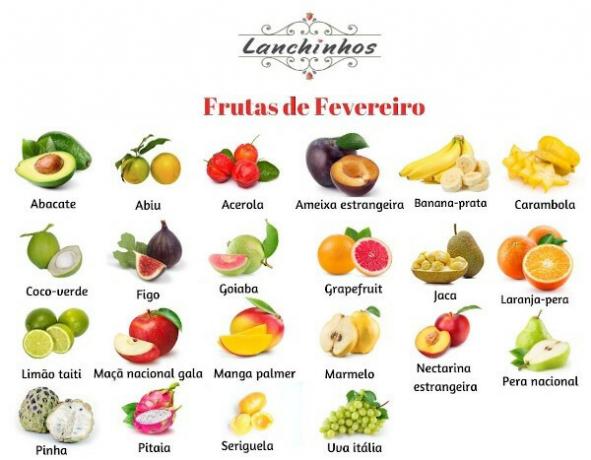Carlos Drummond de Andrade was born in Itabira, Minas Gerais, on October 31, 1902. In 1919, an intern at Anchieta College, in Nova Friburgo, he was expelled for “mental insubordination”. He published his first book — some poetry — in 1930. He worked in the office of the Minister of Education and Public Health Gustavo Capanema and retired as section head of the Directorate of National Historical and Artistic Heritage (DPHAN) in 1962.
Author belonging to the second phase of Brazilian modernism, Drummond presents a poetry with formal freedom and sociopolitical themes. However, his texts are mainly marked by everyday themes, which, even culturally located, assume a universal character. The poet, winner of the Jabuti Prize in Brazil and the Morgado de Mateus Prize in Portugal, died on August 17, 1987, in Rio de Janeiro.
Read too: Mario Quintana – poet associated with ssecond fase of modernism
Biography of Carlos Drummond de Andrade

Carlos Drummond de Andrade was born in Itabira, Minas Gerais, on October 31, 1902
. In 1910, he began studying at Grupo Escolar Dr. Carvalho Brito, in his hometown. In 1916, he began his studies at the Arnaldo boarding school and college, in Belo Horizonte. As early as 1918, went to live in Nova Friburgo, in the state of Rio de Janeiro, to study as an intern at Anchieta College. He stayed there for only a year, as he was officially expelled for “mental insubordination”, after having a conflict with his Portuguese teacher.In 1923, he started the pharmacy course at the School of Dentistry and Pharmacy of Belo Horizonte, completed in 1925. So, this year, it was one of the founders ofmodernist journalThe magazine. And he had no interest in working as a pharmacist. So, in 1926, he worked as teacherof geography and portuguese, in Itabira. But that same year, he returned to Belo Horizonte to be a copywriter at Mine Diary, and, in 1929, he became an assistant editor and, later, editor of the Minas Gerais, official organ of the State.
It was in 1930 that the poet published his first book — some poetry — independently, ie with its own resources. Still in 1930, he began working as a cabinet officer for Gustavo Capanema (1900-1985), then Secretary of Interior and Justice of Minas Gerais, to become, in 1934, Capanema's chief of staff, now Minister of Education and Public Health. Thus, he only gained national recognition as a writer in 1942, with the publication of Poetry.
In 1945, it became co-director of the communist periodical People's Tribune, but left the post months later, in disagreement with the newspaper's guidelines. That year, he started working at Directorate of National Historical and Artistic Heritage (DPHAN), where he would retire as head of section in 1962.
Received the following awards:
Felipe d'Oliveira Society Award, for the work as a whole, in 1946;
Jabuti Prize, in 1968;
Award from the São Paulo Association of Art Critics (APCA), in 1973;
Estácio de Sá Award, for journalism, in 1980;
Morgado de Mateus Prize, for poetry, in Portugal, also in 1980.
In 1982, he received the doctor's title honoris causa of the Federal University of Rio Grande do Norte (UFRN). He died in Rio de Janeiro on August 17, 1987.
Literary characteristics of Carlos Drummond de Andrade
Drummond was part of second phase of Brazilian modernism, which lasted from 1930 to 1945. The works from this period have the following characteristics:
contemporary theme
Existential crisis
spiritual conflict
sociopolitical theme
language freedom
formal freedom
Realism
![Statue of Carlos Drummond de Andrade, in Rio de Janeiro. [1]](/f/f6a09a2036439dcb16d00baab1218160.jpg)
The author also has, as an individual characteristic, the everyday theme, and still manages, based on the particular, reach the universal. By this we mean that the meaning of his poems goes beyond borders. What we can see in his poem “Toada do amor”:
[...]
You shouldn't curse your life,
we live, then forget.
Only love comes back to fight,
to forgive,
bandit dog love train.
[...]
Mariquita, give the whistle,
in your pito is infinity.
In these fragments, we can identify universal elements, such as love and infinity (in this case, reflection), alongside particular elements, such as the regional terms “train” and “pito”. In addition, when saying that "in your mouth is the infinite", the lyrical self associates the everyday act of smoking to a moment of reflection, in a time when people stopped to smoke and, consequently, think about existence.
Read too: Manuel Bandeira – author who underwent several changes in his work
Works by Carlos Drummond de Andrade
→ Poetry
some poetry (1930)
marsh of souls (1934)
feeling of the world (1940)
Poetry (1942)
the people's rose (1945)
new poems (1948)
clear riddle (1951)
pocket viola (1952)
air farmer (1954)
life cleaned up (1955)
stuff lesson (1962)
verse (1967)
boitempo (1968)
the lack that you love (1968)
Nudity (1968)
the impurities of white (1973)
old boy (1973)
The visit (1977)
Spring Speech and some shadows (1977)
the marginal Clorindo Gato (1978)
forget to remember (1979)
The measured passion (1980)
dress case (1983)
Body (1984)
me, tag (1984)
love is learned by loving (1985)
wandering poetry (1988)
natural love (1992)
farewell (1996)
→ Prose
Mine Confessions (1944)
apprentice's tales (1951)
Island tours (1952)
speak almond tree (1957)
The Purse & Life (1962)
My life (1964)
Rocking chair (1966)
Paths of João Brandão (1970)
The ultra-young power and over 79 texts in prose and verse (1972)
News & not news chronicles (1974)
70 little stories (1978)
plausible tales (1981)
mouth of moonlight (1984)
the observer in the office (1985)
life time poetry (1986)
girl lying on the grass (1987)
the reverse of things (1988)
Self-portrait and other chronicles (1989)
Examples of texts by Carlos Drummond de Andrade
As it became evident, the work of Carlos Drummond de Andrade is extensive. Many of the author's poems have fallen in favor of readers, such as the “Quadrilha” in the book some poetry. It is possible to verify the everyday theme, that is, the dynamics of love relationships, which is also universal. Written in free verse (without meter and without rime), the poem demonstrates the influence of first generation modernist:
Gang
João loved Teresa who loved Raimundo
who loved Maria who loved Joaquim who loved Lili
who didn't love anyone.
João went to the United States, Teresa to the convent,
Raimundo died of disaster, Maria was left to aunt,
Joaquim committed suicide and Lili married J. Pinto Fernandes
that had not entered history.
![Cover of the book “Sentimento do Mundo”, by Carlos Drummond de Andrade, published by Companhia das Letras. [2]](/f/7b2efa7def160503345b7243b35d0d8b.jpg)
Already "The worker at sea", a prose poetry published in your book feeling of the world, brings the sociopolitical perspective very common to second generation of Brazilian modernism. In this text, the poetic voice exposes the difficult social condition of the worker, who lives an alienating reality and so far from the reality of the lyrical self, as we can see in this excerpt:
A worker passes by in the street. How steady he goes! He doesn't have a shirt. In the short story, in the drama, in the political discourse, the worker pain he is in the blue blouse, thick cloth, thick hands, huge feet, huge discomforts. This is an ordinary man, just darker than the others, [...]. Ahead is just the field, with some trees, the big advertisement for American gasoline, and the wires, the wires, the wires. the worker you have no time to realize that they carry and bring messages, which count from the Russia, of Araguaia, From U.S. don't listen, in the Chamber of Deputies, the opposition leader ranting. [...]. it would have ashamed to call you my brother. He knows he's not, he was never my brother, that we will never understand. And despises me... Or maybe it's I despise me myself to your eyes. [...] who knows if one day I will understand?
Finally, also from the book feeling of the world, the poem “International Fear Congress” reflects the sentiment shared by many people around the world during the period preceding the Second World War (1939-1945):
Provisionally we won't sing love,
who took refuge below the underground.
we will sing the fear, which sterilizes the hugs,
we won't sing the hate because this one doesn't exist,
there is only fear, our father and our partner,
the great fear of the hinterlands, the seas, the deserts,
fear of soldiers, fear of mothers, fear of churches,
we'll sing fear of dictators, fear of democrats,
we'll sing the fear of death and the fear of after death,
then we will die of fear
and over our graves will bloom yellow and fearful flowers.
Image credits
[1]Rodrigo S Coelho / Shutterstock
[2] Company of Letters (reproduction)
by Warley Souza
Literature teacher
Source: Brazil School - https://brasilescola.uol.com.br/literatura/carlos-drummond.htm

